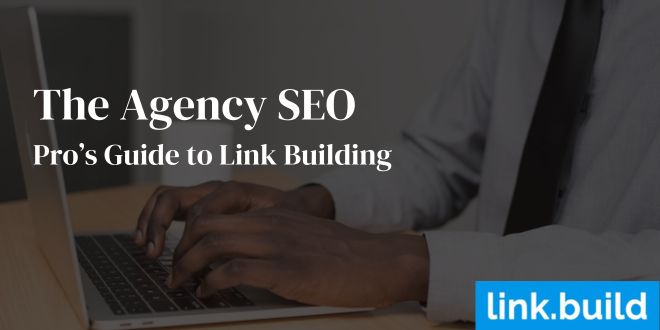The Agency SEO Pro’s Guide to Link Building

As an agency SEO professional, you have a lot to manage. Your responsibilities encompass more than just optimizing for search engines; they extend to various critical aspects, including link building strategies and implementing an effective link building campaign. You must identify target keywords, formulate and explain link building strategies for securing high-quality links, set client expectations to ensure they understand the significance of these efforts for their website's performance on search engines.
In the ever-evolving landscape of SEO, you're tasked with answering client questions and addressing their concerns about the link building efforts and how they impact their online visibility. While managing content and ensuring it complements your broken link building efforts, you must also be diligent in reporting on the results achieved through these link building strategies.
Amidst these multifaceted responsibilities, your ultimate goal is to enhance your clients' online presence, and the last thing you want is to worry about the possibility of your link building campaign inadvertently leading to manual or algorithmic penalties. Hence, it's essential to execute your link building strategy meticulously to secure high-quality links, ensuring a positive impact on their rankings in the realm of search engine results.
Link building is one of the most difficult, time-consuming tactics to perform in an SEO campaign, especially for agencies managing multiple clients. To make things worse, unnatural or manipulative link building is the most common reason for manual and algorithmic penalties.
So how can you reduce the burden of link building without resorting to untrustworthy outside sources?
Why Link Building Is So Difficult
Link building is an essential part of the SEO process—after all, it’s the primary component in determining a domain’s authority and search engine rankings, but it’s also one of the most problematic pieces of the puzzle. Common challenges with building links include:
Hunting down industry-relevant sources, writing sufficient copy for link building strategies, and scouting for key link building opportunities require substantial amounts of time. Agency SEO professionals don’t have time to perform these steps.
The number of links required to show to clients usually ranges depending on the client’s budget, but larger-budget clients can have link quantity requirements that are intimidating. This is compounded by the fact these requirements usually are due monthly and reset monthly.
Finding the right link sources can be an infuriating task. Not only do you have to find high-authority sources that fit perfectly into your client’s niche, you have to find sources that are willing to publish your content in order to acquire links.
Ever since the launch of Google’s Penguin algorithm, there’s been a looming risk of penalty from link building deemed to be unnatural or manipulative. One questionable link could cost your client all their search visibility if it results in a penalty—leaving you in an especially vulnerable and uncomfortable position.
Navigating the intricacies of link building tactics and securing high quality backlinks while avoiding potential pitfalls can be quite challenging. This involves a combination of keyword research to target relevant websites, acquiring links through a variety of methods like editorial links, guest post links, and link exchanges, and ensuring that not all links are equal in value.
Link building is not just about the quantity of linking domains but also the quality links they provide. When executed effectively, it can drive referral traffic, boost organic traffic, and ultimately influence search engine results to position your clients favorably in the highly competitive search results arena.
Additionally, keeping an eye out for broken links and capitalizing on content creation opportunities that can lead to more links is crucial. It's a delicate balancing act for any link building agency, as they strive to create a robust network of valuable links while avoiding any practices that could lead to unfavorable consequences in the world of search engine optimization.
Critical Outsourcing Risks to Avoid
Because of the challenges and potential mistakes of performing link building tasks in-house, many SEO agencies choose to outsource their link building work, but the risks associated with link building agencies is often an even greater concern.
Link spammers often prioritize quantity over quality when they aim to acquire links naturally. They may take shortcuts, such as article spinning, to generate a multitude of links without producing high quality inbound links. The consequences of these practices can be detrimental, as low-quality content can harm your clients' online presence and reputation, especially when placed on unreliable and non-authoritative websites.
One of the significant challenges with some link building agencies is their reliable reporting. They may promise link building techniques that drive results, but when it's time to report on their success, they may fall short, leaving you with vague or absent reports and leaving your clients in the dark about the progress made.
Outdated techniques used by certain agencies can jeopardize your SEO strategy. Google's evolving algorithms, such as Penguin, demand modern practices that focus on acquiring high quality link embedded in high quality content. Agencies that rely on old-school tactics like article directories or link wheels may harm your clients' rankings and reputation.
Effective communication is crucial in the collaboration with a link building agency. Communication gaps can hinder your ability to address concerns, seek clarifications, or make necessary adjustments to your link-building initiatives. Having a reliable point of contact is essential for efficient issue resolution and client satisfaction.
Maintaining your agency's credibility while outsourcing is vital, and this involves ensuring that your solution is genuinely white labeled. To prevent compromising your clients' perception of your agency, you must partner with a link building provider who can seamlessly integrate their efforts into your existing services, all while abiding by ethical practices that focus on creating high quality content and earning valuable links that enhance your clients' SEO success.
The foundation of successful link building lies in practices that promote the acquisition of high quality links naturally, avoiding the temptation of buying links. It's about targeting authoritative sites and resource pages while producing link-worthy content that acts as link bait for site owners in your target audience. These strategies can lead to more traffic, increased search traffic, and visibility not only in Google but also in other search engines and on other prominent websites. Effective link building strategies involve techniques like guest blogging on target websites with recently published articles, optimizing the link's position for maximum impact, and ensuring the site's relevance to your content to enhance the quality of the seo links pointing to your site.
How to Build Links The Right Way
Building good links comes down to one essential trait: Quality. The definition of what constitutes a “quality” link will differ depending on who you ask; some use metrics such as social shares, while others use domain authority.
Cut the fluff and start with full SEO audit or a granular backlink audit.
These sorts of metrics can certainly help ascertain quality when combined together, but no single metric trumps the “eyeball test” of a trained, quality SEO professional.
As an SEO professional, you know a good link when you see it, and know you a bad link when you see it. And typically, that gut feeling is much more accurate than any set of metrics could provide. Google defines link schemes with a number of examples, but it emphasizes the fact that links should be
editorially placed or vouched for by the site’s owner.
Google goes on to say that
...the best way to get other sites to create high-quality, relevant links to yours is to create unique, relevant content that can naturally gain popularity in the Internet community.
Essentially, Google is telling webmasters to create content, then hope/wait/pray that it gets noticed, and attracts inbound links. While this strategy works just fine for large publishers that already have established brands and get thousands of shares on any new article they publish (such as Mashable or TechCrunch), a more pragmatic approach is needed for just about every other business.It’s true that getting quality inbound links starts with great content on your client’s website, but the missing link is getting journalists, contributors, authors, and editors at quality publications to become aware of that content so that they can link to it when writing relevant stories/articles.
So, how do you build this awareness? The answer is simple, yet difficult to implement: Work directly with the journalists, contributors, columnists and editors at each publication.
You can find and contact them using social media tools like LinkedIn or Twitter, though it can be difficult and time-consuming to identify them, connect with them, and then find their contact information. Many have their contact information hidden or private to reduce the amount of unsolicited spam they receive.
As you build communication and relationships with these journalists, columnists, contributors and editors, offer them value by assisting them with their obligations. It’s helpful to understand the obligations that they have, as well as their goals. Many journalists, contributors, and columnists have quotas, deadlines, and analytics goals (such as article views) to meet. If you can help them meet these obligations, you’ll establish your value. For example, if a columnist has an article deadline approaching, and their column is relevant to your client, but they need a source for a quote or to back up a claim, think about how you may be able to connect your client as the source.
This is very similar to what PR agencies do; indeed, the lines between SEO and PR have become blurred because of the fact that quality inbound links generally provide PR value.
The challenges with this approach, of course, are similar to what I outlined at the beginning of this article: Time, scale, and scope. It simply requires a ton of time and resources to build relationships with journalists, contributors, columnists and editors – often, far more time than an agency SEO professional has.
Bridging the Gap: How to Raise Awareness of Your Clients’ Content
The real challenge is to identify and build relationships with publications. And that’s precisely the challenge for which we at AudienceBloom seek to provide a solution.
Working with more than 700 different publishers, we maintain ongoing relationships with editors, journalists, contributors and columnists, and we employ a team of hand-picked writers and editors that produce amazing content for not only our clients (or yours) but also for publications that have come to rely on us for their own content strategy. In short, our value proposition to our publishers is the unparalleled level of quality content we provide. Our value proposition to our clients is the wide range of quality publishers with whom we work (and with whom we can connect your clients).
We identify high-quality assets on your clients’ sites, such as infographics or highly-detailed articles. If there are currently no linkable assets, we’ll help you create some. Then, we leverage our relationships to find opportunities to link to that content within stories our publishers plan to publish, matching your clients with relevant publications in relevant content.
Together, we’ll work to define the ideal authority level of each link, and in high-authority scenarios, even allow you to hand-pick the target publishers you want to get your client coverage on. When you hand-select a publisher, we’ll also provide you copies of all the content that will be published, allowing for editing and approval before it goes live.
The Link.Build Difference
At AudienceBloom, we know the struggles of link building. We know the complexities of outsourcing. And that’s why we’ve developed an approach that resolves the problems of each.
Transparency
We’ll keep you apprised at every step of the process, and if you ever have any questions, we’ll answer them—quickly, directly, and honestly. With detailed reporting and direct access to one of our account managers, you’ll never be left in the dark.
Reliable White Labeling
We know how important it is to preserve your image as an SEO agency. That’s why our white labeled backlink services guarantee we stay invisible, and all our work gets attributed to you. Agency resellers also receive 20 percent off all our link building services.


.svg)


.jpg)
.jpg)